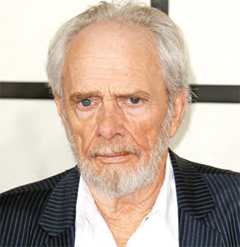 Merle Haggard
Merle HaggardCountry music legend Merle Haggard, an outlaw in both song and life who gave voice to the hippie era's disaffected conservatives before moderating his views, died Wednesday on his 79th birthday. Haggard, who had recently returned to tour despite frequent illness, died following a pneumonia at his home in northern California, a representative said. His son, fellow musician Ben Haggard, wrote on Facebook that his father predicted a week ago that he would die on his birthday and that "he took his last breath surrounded by family and friends."
Tributes poured in from across the music world for Haggard, who released a staggering amount of work over six decades with more than 30 songs that topped the US country charts. "We've lost one of the greatest writers and singers of all time. His heart was as tender as his love ballads. I loved him like a brother," singer Dolly Parton said in a statement. Willie Nelson, a collaborator of Haggard who is the best-known living star of the outlaw country genre, wrote on Facebook that the late singer was "my brother, my friend."
Haggard had the greatest impact with his 1969 hit "Okie from Muskogee," which emerged as an anthem of sorts for the counterculture to the counterculture who had become so prominent among US youth. The song-its title reference to a slang for a person from the conservative Plains state of Oklahoma, in which Muskogee is a small city-tells of pride in the US flag and the war against communism in Vietnam. "We don't smoke marijuana in Muskogee / We don't take no trips on LSD / We don't burn no draft cards down on Main Street / But we love living right and being free," he sings in the opening lines.
Transition from conservative image
While the song became a rallying cry in the US culture wars, Haggard later described "Okie from Muskogee" as an attempt to understand heartland America rather than a statement of his own principles. He became a critic of the more recent war in Iraq and has been an avowed supporter of Democratic presidential hopeful Hillary Clinton, even writing a song in 2007 for her earlier campaign with the line, "Let's put a woman in charge."
"If a guy doesn't learn anything in 50 years, there's something wrong with him," he told Men's Journal last year. In another recent interview, Haggard voiced solidarity with African Americans protesting against police brutality and said the former Confederacy country music's home turf-had not addressed the Civil War. Married five times and the singer of many love ballads, Haggard became best known for outlaw country songs about run-ins with the law-a subject matter he knew first-hand.
Deeply affected by his father's death when he was a child, Haggard learned guitar as a youth and became involved in petty crime, landing in California's San Quentin prison for burglary and put in solitary confinement for brewing moonshine. He credited a 1958 performance at the prison by legend Johnny Cash-who turned a later concert at San Quentin into a celebrated album-with inspiring him to pursue music.
California country sound
Haggard's family hailed from Oklahoma but he was born and lived his life in California, where he picked up diverse influences including pop and especially the blues on his guitar. He became a leading force in the Bakersfield Sound, named for the southern California oil town settled by many Southern transplants, which emphasized electric guitar over Nashville's string arrangements. His other well-known hits included "Mama Tried," which became a favorite cover song for hippie-era rock greats the Grateful Dead, as well as "Workin' Man Blues," an ode to blue-collar values, and "Pancho and Lefty," a cover of a bandits' tale performed with Nelson.
Haggard teamed up again with Nelson last year for an album that, in another sign of how far he had come from "Okie from Muskogee," features the paean to marijuana "It's All Going to Pot." Haggard in his later years was outspoken in his dislike of modern country music. Last year, he told a North Dakota newspaper that Nashville was churning out formulaic songs about sex. "I don't find no substance. I don't find anything you can whistle and nobody even attempts to write a melody," he said.-AFP










